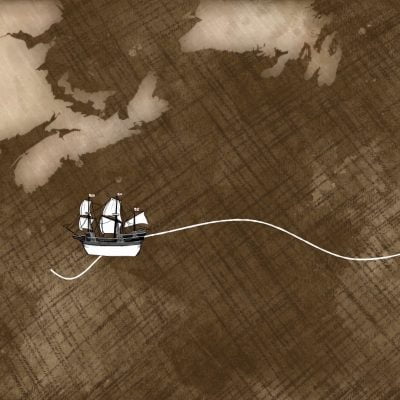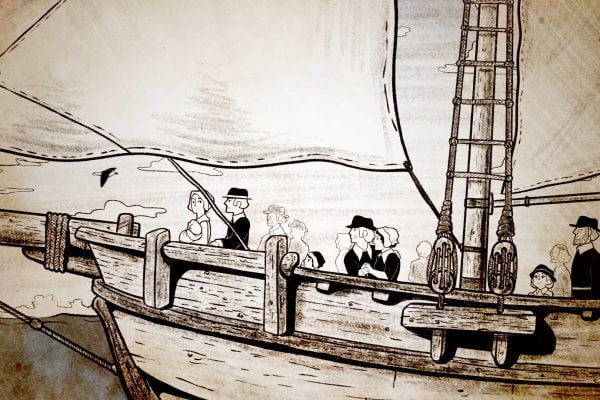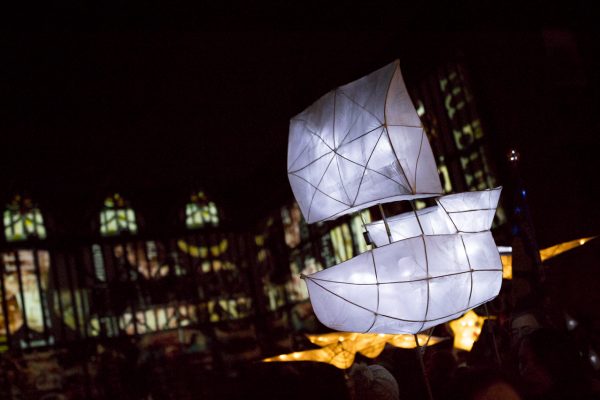
The Pilgrims leave England for the last time
The Mayflower set sail from Plymouth on the 16th September 1620 – or the 6th September according to Bradford’s diary (to explain, and just to make things a bit more complicated, in 1752, the Old Style Julian calendar was changed to the New Style Gregorian calendar we know today – 11 days were dropped from September and before that the year ended on 24th March).
Many of the Separatist families from Leiden who had been on the leaky Speedwell were now on the Mayflower with other families, all setting off as colonists for a New World – new of course to them, but not to the indigenous people who had lived there for thousands of years.
In later years, Bradford listed those passengers in his diary, as a mixture of families, servants, and children:
“The names of those which came over first, in the year 1620 and were by the blessing of God the first beginners and (in a sort) the foundation of all the Plantations and Colonies in New-England; and their families.
8 Mr. John Carver; Kathrine, his wife; Desire Minter; & 2 man-servants, John Howland, Roger Wilder; William Latham, a boy; & a maid servant, & a child that was put to him, called Jasper More.
6 Mr. William Brewster; Mary, his wife; with 2 sons, whose names were Love & Wrestling; and a boy was put to him called Richard More; and another of his brothers. The rest of his children were left behind, & came over afterwards.
5 Mr. Edward Winslow; Elizabeth, his wife; & 2 men servants, called George Soule and Elias Story; also a little girl was put to him, called Ellen, the sister of Richard More.
2 William Bradford, and Dorothy, his wife; having but one child, a son, left behind, who came afterward.
6 Mr. Isaac Allerton, and Mary, his wife; with 3 children, Bartholomew, Remember, & Mary; and a servant boy, John Hooke.
2 Mr. Samuel Fuller, and a servant, called William Butten. His wife was behind, & a child, which came afterwards.
2 John Crackston, and his son, John Crackston.
2 Captain Myles Standish, and Rose, his wife.
4 Mr. Christopher Martin, and his wife, and 2 servants, Solomon Prower and John Langemore.
5 Mr. William Mullins, and his wife, and 2 children, Joseph & Priscilla; and a servant, Robert Carter.
6 Mr. William White, and Susanna, his wife, and one son, called Resolved, and one born [on] ship … called Peregrine; & 2 servants, named William Holbeck & Edward Thomson.
8 Mr. Steven Hopkins, & Elizabeth, his wife, and 2 children, called Giles, and Constanta, a daughter, both by a former wife; and 2. more by this wife, called Damaris & Oceanus; the last was born at sea; and 2 servants, called Edward Doty and Edward Lister.
1 Mr. Richard Warren; but his wife and children were left behind, and came afterwards.
4 John Billington, and Ellen, his wife; and 2. sons, John & Francis.
4 Edward Tilley, and Ann, his wife; and 2 children that were their cousins, Henry Samson and Humility Cooper.
3 John Tilley, and his wife; and Elizabeth, their daughter.
2 Francis Cooke, and his son John. But his wife & other children came afterwards.
2 Thomas Rogers, and Joseph, his son. His other children came afterwards.
3 Thomas Tinker, and his wife, and a son.
2 John Rigsdale, and Alice, his wife.
3 James Chilton, and his wife, and Mary, their daughter. They had another daughter, that was married, came afterward.
3 Edward Fuller, and his wife, and Samuel, their son.
3 John Turner, and 2 sons. He had a daughter came some years after to Salem, where she is now living.
3 Francis Eaton, and Sarah, his wife, and Samuel, their son, a young child.
10 Moses Fletcher, John Goodman, Thomas Williams, Digory Priest, Edmond Margesson, Peter Browne, Richard Britteridge, Richard Clarke, Richard Gardener, Gilbert Winslow.
1 John Alden was hired for a cooper, at South-Hampton, where the ship victualled; and being a hopeful young man, was much desired, but left to his own liking to go or stay when he came here; but he stayed, and married here.
2 John Allerton and Thomas English were both hired, the later to [become master] of a shallop here, and the other was reputed as one of the company, but was to go back (being a seaman) for the help of others behind. But they both died here, before the ship returned.
2 There were also other 2 seamen hired to stay a year here in the country, William Trevor, and one Ely. But when their time was out, they both returned.
These, being about a hundred souls, came over in this first ship; and began this work, which God of his goodness hath hitherto blessed; let his holy name have the praise.”
And so, their voyage had begun, setting out from Plymouth a final time, later than planned and facing the wintry Atlantic weather:
“Sept: 6. These troubles being blown over, and now all being compact together in one ship, they put to sea again with a prosperous wind, which continued diverse days together, which was some encouragement unto them; yet according to the usual manner many were afflicted with sea-sickness.”
Next week: Servitude – who were the servants on the Mayflower?




